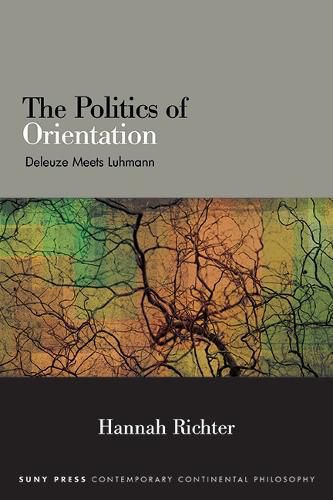Readings Newsletter
Become a Readings Member to make your shopping experience even easier.
Sign in or sign up for free!
You’re not far away from qualifying for FREE standard shipping within Australia
You’ve qualified for FREE standard shipping within Australia
The cart is loading…






This title is printed to order. This book may have been self-published. If so, we cannot guarantee the quality of the content. In the main most books will have gone through the editing process however some may not. We therefore suggest that you be aware of this before ordering this book. If in doubt check either the author or publisher’s details as we are unable to accept any returns unless they are faulty. Please contact us if you have any questions.
Interlinks Gilles Deleuze's critical philosophy with Niklas Luhmann's systems theory to unpack contemporary democratic politics as a contest for complexity-reducing orientation in sense.
The Politics of Orientation provides the first substantial exploration of a surprising theoretical kinship and its rich political implications, between Gilles Deleuze's philosophy and the sociological systems theory of Niklas Luhmann. Through their shared theories of sense, Hannah Richter draws out how the works of Luhmann and Deleuze complement each other in creating worlds where chaos is the norm and order the unlikely and yet remarkably stable exception. From the encounter between Deleuze and Luhmann, Richter develops a novel take on postfoundational ontology where subjects and societies unfold in self-productive relations of sense against a background of complexity. The Politics of Orientation breaks and rebuilds theoretical alliances by reading core concepts and thinkers of Continental Philosophy, from Leibniz to Whitehead and Marx, through this encounter. Most importantly, the book puts Luhmann and Deleuze to work to offer urgently needed insight into the rise of post-truth populism. In our complex democratic societies, Richter argues, orientation against complexity has become the ground of political power, privileging the simplistic narratives of the populist right.
$9.00 standard shipping within Australia
FREE standard shipping within Australia for orders over $100.00
Express & International shipping calculated at checkout
This title is printed to order. This book may have been self-published. If so, we cannot guarantee the quality of the content. In the main most books will have gone through the editing process however some may not. We therefore suggest that you be aware of this before ordering this book. If in doubt check either the author or publisher’s details as we are unable to accept any returns unless they are faulty. Please contact us if you have any questions.
Interlinks Gilles Deleuze's critical philosophy with Niklas Luhmann's systems theory to unpack contemporary democratic politics as a contest for complexity-reducing orientation in sense.
The Politics of Orientation provides the first substantial exploration of a surprising theoretical kinship and its rich political implications, between Gilles Deleuze's philosophy and the sociological systems theory of Niklas Luhmann. Through their shared theories of sense, Hannah Richter draws out how the works of Luhmann and Deleuze complement each other in creating worlds where chaos is the norm and order the unlikely and yet remarkably stable exception. From the encounter between Deleuze and Luhmann, Richter develops a novel take on postfoundational ontology where subjects and societies unfold in self-productive relations of sense against a background of complexity. The Politics of Orientation breaks and rebuilds theoretical alliances by reading core concepts and thinkers of Continental Philosophy, from Leibniz to Whitehead and Marx, through this encounter. Most importantly, the book puts Luhmann and Deleuze to work to offer urgently needed insight into the rise of post-truth populism. In our complex democratic societies, Richter argues, orientation against complexity has become the ground of political power, privileging the simplistic narratives of the populist right.